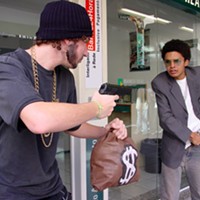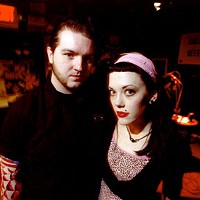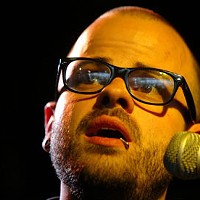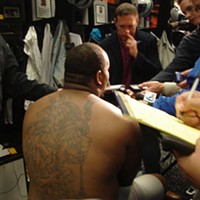Out of the Civil Rights Movement in the 1960s, Dr. Maulana Karenga invented a nonreligious celebration for the African diaspora (people of African descent who live off the continent) to commemorate their rich heritage and to ensure its successful translation to future generations. Hallmark excluded, creating a holiday is a fairly difficult proposition. Expanding from a small group of zealous followers in Oakland to millions nationwide was no small feat; but there's a limit to how much giddiness Dr. Karenga and company will derive from their growth. It is quite unsettling that in this information age, Kwanzaa is continually perceived as the whimsical stepchild of Christmas.
"We are very serious about Kwanzaa," said Ahmad Daniels during the Kwanzaa 101 lecture at the Afro-American Cultural Center. Whenever Kwanzaa does garner media attention, it's usually just to show a snippet of African dance, and the coverage rarely delves into the meaning of the celebration. Dance is not even an official element, though it is sometimes incorporated into public observances.
"Never -- and I can say never as an absolute term -- never have they focused on the speaker and what the speaker was talking about," Daniels said, referring to television coverage of the holiday. "America wants to be entertained. We don't want to learn that much. Somehow black people as a whole are viewed as entertainers, be it on the stage, on the basketball court or the football field."
The closeness Kwanzaa's customs share with other December holidays is another source of public confusion. The reasoning behind placing the seven-day celebration a day after Christmas was twofold: Families would already be congregated for the holidays, and on the day after Christmas, store prices plummet. The exchange of gifts is intended for children and differs in nature from other gift-related holidays.
"Kwanzaa is not a black Christmas. Let me say that two more times," Daniels said before repeating it two more times. "During Christmastime people spend to show their love. A Kwanzaa gift should be a hand-made item, and every gift should include a book. It can be about African culture, or anything. We must esteem reading."
At Kwanza 101, Everything You Always Wanted To Know But Were Afraid To Ask, a table of Kwanzaa items was displayed in front of the 15 people in attendance. "Does anyone know what this is?" asked Daniels, pointing to a candle-holding instrument?
"It's a menorah," a girl blurted out with confidence.
Daniels corrected her and told her it was a kinara.
"Are the candles still called candles?" the girl asked.
The kinara does look exactly like a menorah, but Daniels says that's just a coincidence. "Hebrew and Kiswahili, in that particular instance, have words that sound similar when they both lay claim to an item that looks somewhat alike."
Kwanzaa wasn't just invented out of the blue. Many African cultures, from ancient tribes including Egyptian and Nubian to more modern ones such as the Zulu and Matabele, celebrate the first fruits -- a ceremony for the year-end harvest that extended into a larger commemoration of the tribe's history and a reaffirmation of bonds. Out of that event, Karenga developed Kwanzaa's seven principles (Nguzo Saba), which in English translate to unity, self-determination, collective work and responsibility, cooperative economics, purpose, creativity and faith.
Each topic and night is supposed to facilitate a conversation. To that end, the informational session at the Afro-American Cultural Center turned into a discussion on the state of African American affairs. For collective work and responsibility, Daniels discussed the need for African Americans to think more collectively: "Forty-five thousand people in Montgomery took Rosa Parks' problem on as their own problem."
For cooperative economics, he said the dollar only turns over once in the African American community: "We live paycheck to paycheck and blow it all at the mall."
Faith is not to be interpreted as religious faith: "When those Africans arrived in 1619, they had faith that someday life would be different for them. They couldn't see it and many of them never saw it. Denmark Vesey, Nat Turner, Harriet Tubman, Frederick Douglas never stopped trying to bring about change."
Teresa McIlwain has been celebrating Kwanzaa in Charlotte for four years, and she's exposed many of her African American friends to the holiday. Still, very few celebrate, she says. "Most get caught up in the struggles of their day-to-day life. They don't read, so they don't know much about it," says McIlwain.
That's precisely why there's no television in McIlwain's house, where she raises her eight kids.
Donna Dawson got involved in Kwanzaa after being horrified at the disrespectful behavior of the African-American youths at her son's high school. Instead of listening to the teacher, the kids were in the back of the room playing music. She was further sickened by the assistant principal's response to her complaint. "We just do what we can to make it through the day," he told her.
That's when Dawson became proactive about strengthening Charlotte's African American community. Recently at Dillehay Courts, a low-income housing complex that hosted Daniels' lecture on Rosa Parks, Dawson was amazed when a troubled youth recited a poem about inspiration he drew from the sacrifices other African Americans made for him.
Since Daniels began holding public Kwanzaa observances in Charlotte, he's seen them grow from one night with modest attendance to all seven, with 700 to 800 people showing up for the first and last nights. Daniels is not concerned with how the mainstream public views Kwanzaa: "I believe rather than curse the darkness, light a candle -- and in this case we're talking about Kwanzaa candles."
Latest in Urban Explorer
More by Jared Neumark
-

Best of The Blotter 2007
Nov 28, 2007 -

Preaching and drinking
Mar 7, 2007 -

Preaching and Drinking
Dec 27, 2006 - More »
Calendar
-

Queen Charlotte Fair @ Route 29 Pavilion
-

NEW WINDOW GALLERY-Pat Rhea-ACRYLIC PAINTINGS-April 05-30 2024 VALDESE, NC 28690 @ New Window Gallery/Play It Again Records
- Through April 30, 12 p.m.
-

TheDiscountCodes
-

Wine & Paint @ Blackfinn Ameripub- Ballantyne
-

Face to Face Foundation Gala @ The Revelry North End









